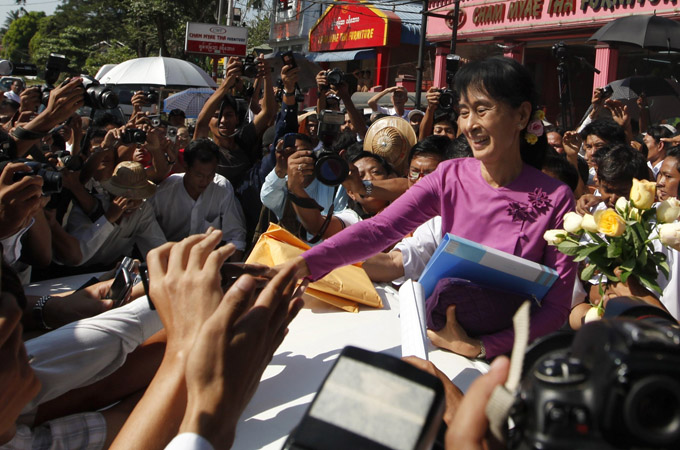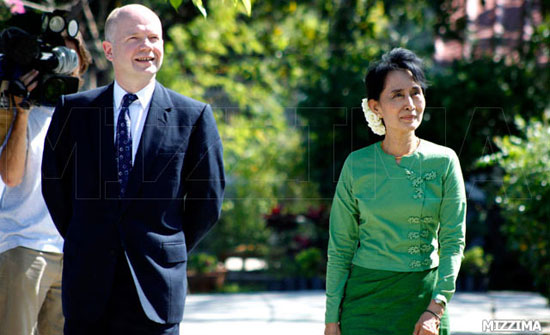Abid Bahar, PhD
On December 31st 2011, Arakanese Diaspora marked its 227th anniversary of the fall of the famous Arakanese medieval kingdom. Arakan's powerful kingdom was established by King Noromikhla. Arakanese nationals didn’t forget that in 1784 Burmese king Budapaya sent a large army led by his son who mercilessly razed the city to ground and took away the Arakanes symbol of pride - the Mohamini to the Burmese heartland. It was a genocide pure and simple, it was also the end of a kingdom which was known far across the land upto Europe. It was a kingdom that was built by artisans that Noromikhla brought from Gour of Bengal. It was a liberal, civilized kingdom and its citizens prided themselves to be called as the citizens of the great Mrohaung city. The ruling people were known as the Moghs now Rakhine Mogh and others were called as the Kula (Hindus and Muslims) now Rohingya.
In our time, the splandor of Arakan, its people, glorious architects and foreign visitors were all gone, what is left is only its ruines and memories. Arakan continued to have its kingdom for centuries but the end was sudden. It first lost its colonies to the Moghuls then its heartland to the Burmese. The end came as if like a landslide. Till today Rakhine Moghs and Muslims ponder and eager to know why? What went wrong? Some blame that it was it’s lack of unity.
The beginning of the end came when Arakanese king assured the Govornor of Bengal Shah Suja to come to take assilum in Arakan but on his arrival seeing his immense wealth, and his young daughters he wanted to possess them. When Suja refused, the entire family and the associates were mercilessly killed using axe. The Arakanese queen mother previously warned the king that this act might invite disaster on the kingdom. The king didn’t comply. The queen mother was a debout Buddhist and a historian who also knew that when the founder of the kingdom (Noromikhla) needed a shelter, it was Bengal where he was given a safe heaven. Not only that Bengali king helped Noromikhla to recover his kingdom twice, first by sending General Wali Khan then by General Sindhi Khan. She thought killing Shah Suja was a bad example set by the king.
The king also earned his fame for collecting revenue by piracy on lower Bengal with help from the Portuguage pirates. Moghul emporor Aurangozev wanted to bring an end to these illegal activities by the king. His forces driven the Mogh pirates out from lower Bengal.
The pirates came back home with their maruding holligan culture. Instead of a buddhist faith in nonviolence, anarchy and lawlessness and killing were brought into its core cultural belief system. They found their scapegoat in the Muslim population. The Arakanes Moghs finding the end of piracy now engaged themselves in harming its nonbuddhist citizens. Thus began the Rohingya Muslim tragedy in Arakan. Alaol, the Arakanese Muslim poet had to escape Arakan to settle in Chittagong during this period.
Beginning of the Rohingya influx to Bengal
---------------------------------------------------
In the Arakanese society where Muslims use to be the king-makers now after the return of the pirates, they are seen as suspects and on a regular basis they were driven out of Arakan. Every year Muslims would migrate to Southern Chittagong to escape Mogher Upodrop (the lawlessness of the Moghs).
This state of anarchy and the division in the Arakanese society was closely observed by the Burmese king across the Arakan Yoma. There were Mogh spies of Budapawa in whose alliance a date was set on the calender. It was December 31. 1784 AD slated to bring the end to the Arakanese kingdom. A large number of people both Buddhist, Hindus and Muslims fleed and took shelter in Chittagong. The invasion cost both the Buddhist and Muslims to lose their very own Arakanese kingdom. After the tragedy of Shah Suja and Burmese invasion of Arakan, the flow Mogh, Muslim and Hindu refugee movement continued to Chittagong and Chittagong Hill Tracts on one hand, on the other, Muslim migration to Arakan was brought to a complete hault. Eversince Muslim population hardly wanted to settled in the "lawless Arakan." Even during the British period, beginning from 1824, Arakan, the deserted land of the Mogh and the Muslims while some people (Mogh and Muslims) returned back to reposses their lands and others simply preferred to work as the "seasonal workers."
In Arakan today, unlike king Noromikhla tolerance to diversity, the ultranationalist Rakhine Moghs using Islamphobia and a race card against the Rohingya people now triumped into power. Through propaganda in Arakan and Burma, Muslim Rohingyas were made to believe as the "illegal immigrants from Chittagong." There is only despare and there is no unity in the Arakanes civil society. We collectively wonder why?
In 2011, Ko Tin Wai, an organizer for the event of 227 anniversary of the lose of the kingdom said, "Arakan was a sovreign country…Since then, our people have fallen in one colony after another. Even though Burma regained independence in 1948, our land is s till a colony under Burmese rulers. Our people call it a hidden colony. Because of this, we came to in front of the UN building to demand decolonization of our land."
He said, "We have no right to use our own natural resources for our state development. The Burmese government sells the gas to China and there is not any reserve or revenue for our state. It is colonial-style exploitation by the Burmese government."
True, Burma is grabing Arakanese land and natural resources and its Buddhist population helplessly wonders why.
“Ko Zar Ni, an Arakanese leader in Malaysia who led a ceremony in Kuala Lumpur, said, "The Burmese government has no concern for Arakan as a state of Burma and it rules our state as if it is a territory like a defeated colony because there is much discrimination and no equal rights. Because of this we need to fight unitedly against the imperialism practiced by Burma's central government.”
“U Pho Hla, chairman of the Arakan freedom movement, urged the people of Arakan to unite in fighting against the Burmese junta in order to reach the national goals of Arakan. He also remarked to attendees that Arakan lost its sovereignty in 1784 as a result of disunity among the Arakanese people, so Arakanese today must unite in achieving their goals. He added that without unity, "we can not achieve our goal."
In emphasizing the Arakanese unity Arakan observers wonder, is it the unity within the Buddhist majority, or in the society in general? To bring unity among its people, Rakhine Moghs have lately changed their name from Mogh to Rakhine. They also unilaterally Changed Arakan’s historic names into Rakhine-Mogh sounding names. And every trace of Muslim names were removed. It was done as if there were no Muslim existence in Arakan. The Muslim Rohingyas are only foreigners or even "Influx Viruses." The existences of Muslim presence in names were removed such as Arakan, Akyab, Kaladan, Kalapanjar etc. Muslims in 1978, 1992-93 were exterminated in large numbers. Some historic mosques were razed to the ground. Historic sufi centres, Jamei mosques were turned into Burmese military camps. Muslim man were restricted from movement, marriage and having children were restricted by law. In his article “The Burma I love” Aye Kyaw confessed that he convinced the Burmese military junta to officially declare the Arakanese Rohingya Muslims as non citizens of Burma.
While during the late medieval period, Arakan ruled the Bay through alliance with the Portuguage to carry on slave trade, now in alliance with the much hated Burmese military it carries out the ethnic cleansing and genocide on the Rohingya people and grabbing their lands.
Contrary to its medieval time of glory and splendar, now the name Arakan has become notoriously famous for producing refugees. While Burmese military does the darty laundry for the ultranationalist Rakhine Moghs like Aye Kyaw, Aye Chan or Ashin Nayaka to exterminate the Rohingyas, the former finding no unity in the Arakanese society among its people, extracts its rich resources and takes it to Burma; it is as if Burma robs Arakanese Mohamuni repeatedly and will continue to do so for lack of unity among its people.
Historically speaking, mentioned earlier Arakan’s end came at the heel of a historic murder; a senseless killing, the slaughter of Shah Suja and his family. Thus, Arakanese Buddhist people’s historic loss of their kingdom should not be blamed on the Burmese king but on the loss of Arakanese Buddhist’s supreme civilizational values (first established in Arakan by king Noromikhla) He wanted people to be gentle, kind to their fellow citizens, and to show tolerance to differences. In not learning to gain the lost values, we wonder how much more is there for Arakan and its citizens to lose? A Rohingya deadbody of Rohingya boatpeople, flooting on the shore of Arakan, crows landing on it, Immum Ahamed in exile in a poem he wrote remembering the lose of his home and citizenship rights and reminacing the loss and his nostalgia to return back to his village and the prospect of it perhaps has the answer. Here Arakanese Buddhist majority will have to decide whether they would like to allow Immam Ahamed to return to his village, whether they would like to handover Aye Chan to the ICC like Maloslovick was handed over (by Servia) and make a transition in Arakan from a Mogher mulluk (lawless land of the Moghs) into a civilized, united Rakhine and Rohingya people’s Arakan! The international community aware of the ongoing genocide in Arakan is impatiently eager to know when those changes will be made!
(Abid Bahar is a playwright and a public speaker specializes in Burma, and teaches in Cannada)
 “The Nasaka categorized the blacklist children are; -- a child from a parent who married with authority permission but not in a family list; a child from a family whose father not at present while enlisting but the parent married with authority permission; a child from a parent without authority permission.”
“The Nasaka categorized the blacklist children are; -- a child from a parent who married with authority permission but not in a family list; a child from a family whose father not at present while enlisting but the parent married with authority permission; a child from a parent without authority permission.” 












